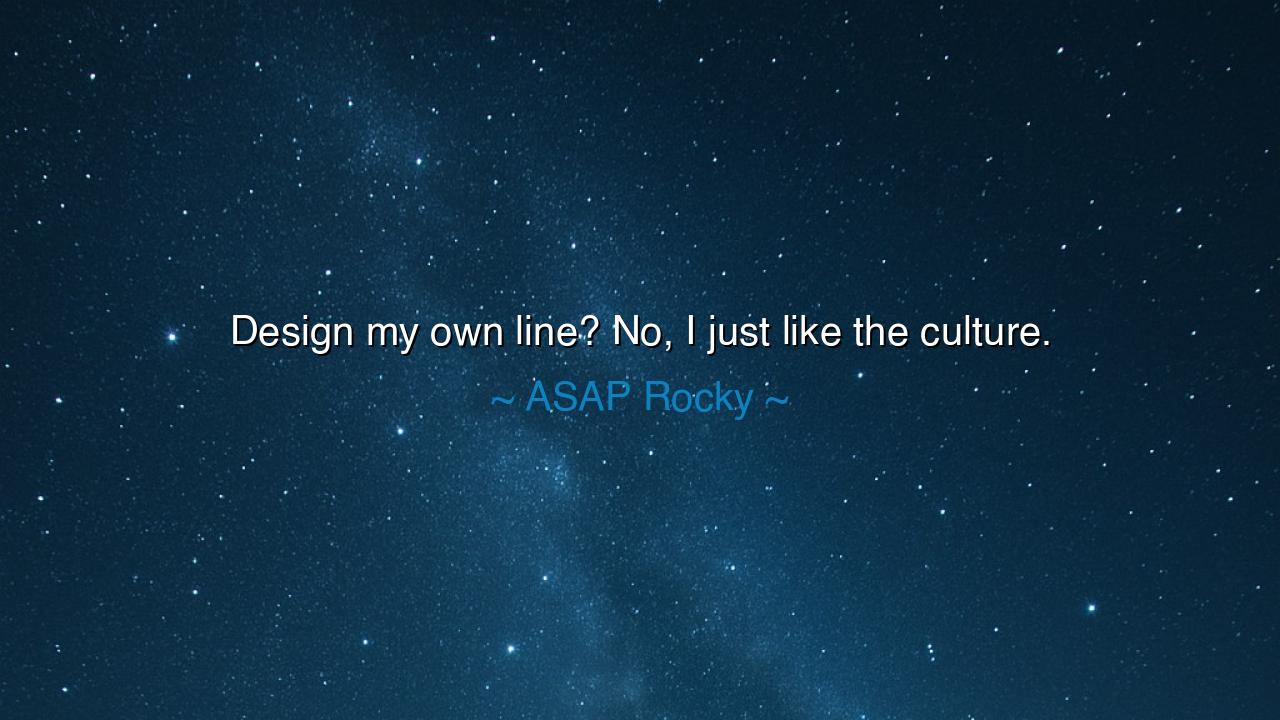
Design my own line? No, I just like the culture.






“Design my own line? No, I just like the culture.” – A$AP Rocky
Hear these words, O children of art and rhythm, for they come from A$AP Rocky, a poet of the modern age—an artist whose temple is the street and whose language is style. In this simple declaration, “Design my own line? No, I just like the culture,” he reveals a truth both humble and profound: that not every lover of beauty must seek to possess it, and not every artist must carve his name upon the world he admires. He speaks as one who understands that culture itself is sacred—that it belongs not to the maker alone, but to the many souls who breathe life into it.
When Rocky says, “I just like the culture,” he speaks of participation without domination, of reverence without ambition. In an age when every voice demands ownership, when every admirer wishes to become a brand, his words are an act of restraint and respect. He honors fashion, music, and art not as commodities, but as living spirits—forms of expression that transcend the individual. Like the ancients who bowed before the muses before writing their verse, Rocky acknowledges that culture is a gift, not a possession. The wise do not always seek to lead; sometimes they serve by appreciating, by keeping the flame alive through admiration rather than control.
To understand his meaning, consider the story of Patronage in the Renaissance, when men like Lorenzo de’ Medici did not paint or sculpt, yet shaped an era by nurturing those who did. Lorenzo did not design his own masterpieces; he loved the culture that surrounded them—the rebirth of art, philosophy, and human expression. He opened his doors to Michelangelo, Botticelli, and Leonardo, knowing that his role was not to replace them, but to sustain the world that made their genius possible. In that same spirit, A$AP Rocky becomes not the creator of fashion, but its custodian, a bridge between artist and audience, a voice that celebrates what already exists rather than seeking to eclipse it.
This wisdom is rare in our time. For the modern world worships the self-made, the founder, the designer—the one who builds an empire in his own image. Yet, as Rocky reminds us, there is glory also in being the lover of culture, the one who absorbs it, wears it, lives it, and keeps it breathing in the hearts of others. The world does not survive on creation alone; it thrives on appreciation. Every song needs a listener, every painting a beholder, every fashion a wearer who understands its soul. Culture dies not when it ceases to create, but when people stop loving it.
And perhaps Rocky’s words carry a subtler defiance—a refusal to let art become mere commerce. For to “design one’s own line” is to enter the market, to be consumed by the machinery of profit and production. By saying, “No, I just like the culture,” he draws a sacred boundary: that some things must be loved for their spirit, not exploited for their value. The culture he speaks of is not a product—it is a community, a pulse, a shared rhythm that cannot be sold or owned. In this, he stands as a modern philosopher among merchants, reminding us that art must first be felt, not branded.
Let this teaching, then, be written in your heart: to love something does not mean to own it. To appreciate is as noble as to create. The dancer honors the music by movement, the admirer by memory. So too should we approach culture—with reverence, with joy, and without the hunger to dominate. In a world that teaches us to turn every passion into a business, A$AP Rocky’s words are a call to return to the purity of love—to find pleasure in the thing itself, without expectation of reward.
So, O listener, if you love something deeply—a song, a style, a way of life—do not rush to brand it, to claim it as your invention. Sit within it. Learn its language. Live it fully. Let it transform you, not your profit. For the truest lovers of culture are not its masters but its guardians—those who keep it alive by their awe, their loyalty, and their joy.
And thus, A$AP Rocky’s wisdom endures: creation begins with appreciation, and culture survives not by those who own it, but by those who truly love it.






AAdministratorAdministrator
Welcome, honored guests. Please leave a comment, we will respond soon